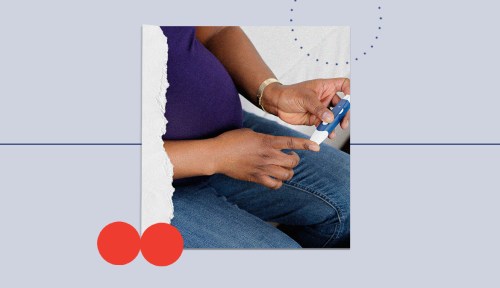It’s been widely reported that Black women are three times more likely to die from pregnancy and childbirth-related complications than white women. And recent surveillance data from the Centers for Disease Control and Prevention (CDC) indicates that maternal mortality among Black women increased by 26 percent between 2019 and 2020. Black maternal health must remain top-of-mind, and Black Maternal Health Week provides an opportunity to elevate conversations among advocates and discuss disparities that persist. So this year, it’s time to talk about gestational diabetes.
Experts in This Article
Kiarra King, MD, is a board-certified physician in obstetrics and gynecology.
Margaret Larkins-Pettigrew, MD, senior vice president and chief clinical diversity & inclusion officer at Allegheny Health Network in Pittsburgh.
Like other types of diabetes, gestational diabetes impacts the body’s ability to use glucose. A 2019 year study published by the CDC studied 765 women from the US National Health and Nutrition Examination Survey with a history of gestational diabetes mellitus (GDM) and found that non-Hispanic Black women and Hispanic women are at greater risk. Among the participants who had GDM, nearly 25 percent developed type 2 diabetes, and Black people with GDM are 10 times more likely to develop type 2 diabetes, according to the CDC.
Researchers aren’t sure why some people get gestational diabetes, but risk factors include lack of physical activity, having prediabetes before pregnancy, dealing with gestational diabetes during previous pregnancies, having polycystic ovary syndrome (PCOS), and family history of diabetes, the Mayo Clinic says.
To that end, Margaret Larkins-Pettigrew, MD, senior vice president and chief clinical diversity & inclusion officer at Allegheny Health Network in Pittsburgh, says that there needs to be greater attention paid to Black health before pregnancy. One of the most significant risk factors for gestational diabetes is excess weight, Dr. Larkins-Pettigrew explains. Begining pregnancy with obesity and developing gestational diabetes leaves patients vulnerable to high blood pressure and preeclampsia, which is a condition characterized by high blood pressure and damage to organs like the kidneys or liver.
Additionally, gestational diabetes can cause significant infant complications, including low birth weight, premature birth, and excessive birth weight, which, Dr. Larkins-Pettigrew says, can complicate vaginal deliveries. The Mayo Clinic also says that babies are at greater risk for type 2 diabetes and obesity later in life.
So what can be done? Because gestational diabetes can create a domino effect of issues for patients and newborns, glucose screenings for hyperglycemia must be done as soon as possible to determine if they are at risk of developing gestational diabetes, both experts say. Additionally, the Mayo Clinic suggests obtaining postpartum glucose screenings as well. Unfortunately, studies have shown that Black patients and other patients of color receive poorer care quality than white patients. This can lead to health issues going undetected for so long that it’s too late to treat them proactively. While Black pregnant people shouldn’t have to save their own lives in the face of medical injustice, having the knowledge and support needed to self-advocate is critical.
“[Black people] deserve the highest quality care that any other patient would get. However, that has not always been provided to us,” says Kiarra King, MD. “I’m always going to treat any patient I see with love and respect, but certainly, if I have a patient that looks like me, I’m like, ‘this could be my mother. This could be my sister, this could be my aunt,’ and I personally want to ensure that regardless of the care they get anywhere else…if they’re seeing me, they’re getting the highest quality care because that’s what they deserve.”
Oh hi! You look like someone who loves free workouts, discounts for cutting-edge wellness brands, and exclusive Well+Good content. Sign up for Well+, our online community of wellness insiders, and unlock your rewards instantly.
Sign Up for Our Daily Newsletter
Get all the latest in wellness, trends, food, fitness, beauty, and more delivered right to your inbox.
Got it, you've been added to our email list.











